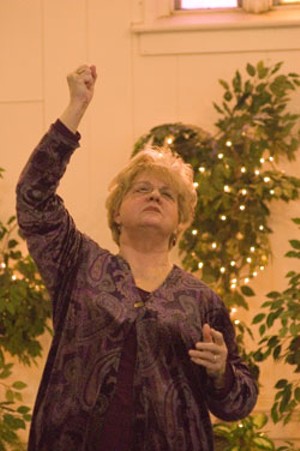Published January 9, 2008 at 1:52 p.m.
In the wake of recent Iowa and New Hampshire presidential primaries, Americans of all political stripes are wondering what their country will look like after George W. Bush’s two-term presidential reign ends on January 20, 2009. Lest we’ve forgotten, Bush’s 2004 victory was due in large part to his appeal among white evangelical Christians — a demographic that represented almost one in four voters. According to a 2006 Pew Research Center report, two-thirds of Americans consider the U.S. a “Christian nation”; almost a third think the Bible “should be more important” than American law.
Among current presidential candidates, Republican Rudy Giuliani and Democrat Hillary Clinton score the highest marks among “key religious constituencies” in their respective parties. Interestingly, Democratic candidates have so far received a slender majority of faith-based campaign bucks, as they did in 2004. As of October 2007, all campaign-cycle contributions from religion-oriented political action committees and individuals surpassed $600,000.
In Vermont, religion doesn’t play as significant a role in politics as it does in other parts of the country, but that doesn’t mean we’re faith free. Though Vermont was the first state government to separate church and state, back in 1807, it also hosted a heap of religious revivals during the “Second Great Awakening” of the early 19th century. Two hundred years later, the Green Mountains are still home to plenty of believers, including some mindful atheists.
New England religion has always had a DIY aspect — new churches and sects could and did sprout everywhere. And they still do. In the following, er, trinity of vignettes, Seven Days visits Sunday services at three of our smaller, edgier Burlington-area churches — each service counted fewer than 30 attendees. Though these politically diverse houses of worship operate with various degrees of accreditation, proselytizing zeal and fiscal solvency, they all fly well below the mainstream-religion radar. Despite modest turn-outs, they all radiate flickers of old-time religious enthusiasm — suggesting that, to some flocks, at least, these United States have seen brighter days.
Unity Church of Vermont
56 Main Street • Essex Junction
On wintry Sundays in Essex Junction, dozens of elegant black coats and white dresses dot the lawn of the brick First Congregational Church. That denomination has claimed most of Vermont’s Christian faithful for more than two centuries. But since 2004, a vinyl-sided rival across the street has been attracting its own squad of adherents.
Welcome to Unity Church of Vermont. A Missouri woman founded the sect with her husband in the 1890s after being miraculously cured of tuberculosis. Now the Association of Unity Churches International boasts about 1000 churches, a CEO and an annual budget of $4 million.
Though affiliated with that international group, Vermont’s 25-year-old Unity branch is independently run. Hence, the church doesn’t have any financial cushion courtesy of national bigwigs — its annual budget of $45,000 to $60,000 comes from local donations. Unity of Vermont bounced around for a while between private residences and Burlington’s Fletcher Free Library in the 1980s and ’90s before taking out a mortgage on this Essex Junction space in 2004.
Unity Reverend Lane Williams is an energetic middle-aged woman who recently moved here from outside Kansas City, Missouri. Today, she’s attired in a shimmery turquoise blouse and Southwestern-style jewelry. The reverend, a graduate of the Missouri-based Unity School of Christianity, explains that Unity’s current Vermont quarters were built in the 1870s — for Methodists.
Sure enough, the church’s interior combines a puritanical aesthetic and new-age flair. The altar and stained-glass windows are standard issue. But there’s an aromatherapy-esque waterfall behind the pulpit. By the entrance, a plaque declares this church a “joy-filled” congregation. “We metaphysicians look for joy in every situation,” Williams announces to the 20-person crowd in a silky voice. “In traffic, in the crowds!”
Her assertion reflects Unity’s über-positive, non-pushy approach to Christian theology. At one point in her service, the Missouri transplant pauses to mention several upcoming self-help classes for congregants: “Creating a Complaint-free World,” “Treasure-Mapping” and “The Quest.” Williams calls the last workshop a “wonderful opportunity to create the life you have always wanted.”
Why the obsession with joy? According to Williams, the J-word isn’t as easy to embrace as many assume. She explains that “trappings of wealth and success,” such as cars and flat-screen TVs, complicate the search for personal satisfaction. Real joy, notes this reverend, results from a lifelong struggle against superficiality. “One man I know believed that his joy would come when he retired,” she recalls, lowering her voice. “The problem is this: Joy is a learned response to life; it’s something that needs to be practiced daily in our lives, not a milestone to be reached.”
Fittingly, the reverend doesn’t take her quest too seriously. Midway through today’s service, for example, she and two other congregation members don what look like Burger King crowns for a very loose interpretation of Chapter Two of the Book of Matthew:
“Aw, jeez, where’s my camel?” asks Williams, one of three “wise guys” — as in the wise men who brought gifts to baby J.C.
“We left it at Smugglers’ Notch, in the snow,” a fellow actor replies.
“So that’s why my feet hurt!” jokes a third.
After the service closes with everybody singing “This Little Light of Mine,” the multi-age group heads downstairs for some sweet treats. Valerie Parauka, a brown-haired country singer who performed at today’s service, sits down before a plate of cookies. “I just want to go a church where any kind of faith is accepted and OK,” she says. “Where it’s more the spirit of the higher power of God, not ‘If you don’t believe, you’re bad, and if you do, you’re good.’”
Parauka, 40, is currently “shopping around” for the right local congregation. But Unity tops her list so far; the musician appreciates that Williams celebrates community service without skimping on “God talk.”
A strong connection between social justice and religious piety has long been a mainstay of the Unity mission. That’s the word from Mary Benoit, a former Vermonter visiting from her current Florida home. Benoit, 59, joined the church in the early 1980s, when it was still meeting at Fletcher Free Library. Even then, she recalls, Unity was doing its part to promote a “flowing notion of prosperity” by sponsoring free neighborhood tag sales.
“Brownie-cheesecake bars!” announces a slender fellow with a salt-and-pepper goatee — as it turns out, a former Methodist who joined this congregation last month. “I individually wrapped them,” he points out. Other congregants hover around the coffee maker.
“You know, the abundance is all around us,” Benoit insists, filling her cup. “Take what you need, give away what you don’t, and whatever you need will be available to you.” These days, Unity donates regularly to the Joint Urban Ministry Project (JUMP), a Burlington-based charity.
Echoing Rev. Williams, Benoit says that gluttonous consumerism clashes with Christian principles. “I think we have this self-deception of what we think we want versus what we do want,” she asserts. “And if we know ourselves well enough, we can stay on the road to our own personal manifestation.”
Perhaps no one has absorbed the Unity mantra better than 82-year-old Mal Chamberlain. As Benoit and Parauka step outside into a balmy winter afternoon, he remains seated at a plastic table. The “has-been chemist,” wearing brown corduroys and thick-rimmed glasses, was “born and raised” Episcopal but lost faith while attending MIT.
“I knew that even though I was agnostic, that guy Jesus had something going for him,” Chamberlain jokes. After moving here as a retiree in 1982, he adopted Unity as his spiritual “frame of reference.”
Since Unity’s 2004 acquisition of this Essex Junction space, “the basic themes have been right on focus,” Chamberlain says. “But the paradox of Unity,” he adds, “is that you need a church to realize you don’t need one!”
United Pentecostal Church
294 North Winooski Avenue • Burlington
When Pastor Paul Lyon moved to Vermont in the summer of 2001, he was a bit hesitant. No wonder: Before coming north, the former Navy commander turned General Dynamics contractor had lived mainly in the South and Midwest. In contrast to the Bible Belt, which boasts a “preponderance” of Pentecostal churches, Vermont only had four.
Now Lyon, 56, has been preaching here for over six years. In addition to giving “ad hoc” sermons at the established United Pentecostal Church (UPC) on Route 15 in Jericho, he has also founded a Burlington UPC chapter. Whereas Jericho welcomes between 60 and 90 congregants, Lyon says, his congregation gets 35 — on good days.
Early gatherings of this church were held in Lyon’s garage, then at the Church of the Nazarene in Williston. Not surprisingly, these past six years have seen challenges of “commitment” among congregation members, not to mention financial hardship. Burlington’s UPC congregation has received assistance from UPC’s headquarter organization, Lyon’s former church in Maryland, the Jericho UPC church, individual donors and, yes, the pastor’s own pockets.
“The ultimate goal is for the church to be autonomous, and that’s what we’re shooting for,” he explains. “I may never get to the point where I can’t have a job, but that’s OK.”
Troubles aside, UPC’s future in Burlington looks bright — literally. A few months ago, Lyon’s B-town crew moved to a sunny room on North Winooski Avenue downstairs from CCTV television studios. The space itself feels, if not Southern, a little beachy: Monstrous tropical plants obscure the windows, and tapestries hang on the walls. With Lyon standing behind the pulpit, the place calls to mind a missionary bungalow in the South Pacific, circa 1970.
By 10:05 a.m. on a recent Sunday, Lyon is churning out the gospel in his stately Southern accent. With a small American flag pinned on his gray blazer, he could be addressing an airport hangar full of Navy reservists. Before him, instead, sit 11 patient disciples — including three of his four kids.
“The end of our lives is gonna come,” declares Lyon, who’s also a licensed commercial pilot. Nearby, his wife Ellen improvises a graceful keyboard accompaniment. “Between the date that I was born and the date I die, there’s a little dash: I don’t want to have any regrets that I wasted that little dash! Jesus came about 2000 years ago, and he’s coming back. I want to be in that place where he can come back for me. Amen.”
Lyon’s presence in Burlington reflects the Pentecostal Church’s evangelical mission. “Even with all of the turmoil goin’ on in Pakistan,” he later says, referring to the assassination of former Prime Minister Benazir Bhutto, “there was [sic] three consecutive crusades recently conducted there, with 2250 people receiving the Holy Ghost.” His data comes from “Focal Points,” the January 2008 newsletter of UPC International. “This does not get front-page press, as we so well know,” Lyon laments.
Despite the Church’s global aspirations, today’s service remains locally oriented. Lyon frequently riffs on the word “community,” for instance. Fifteen minutes into his talk, he stops to ask, “Who here knows the name of your next-door neighbor?” After that, the pastor encourages public prayer. Debbie Titus of Ferrisburgh tells the congregation about a relative who is undergoing chemotherapy. Another woman reports that her brothers are both shipping out for Iraq. “When we pray for our community, remember that it’s people we come into contact with every day,” Lyon reminds them.
Pastor Lyon celebrates a sort of folksy neighborliness. But UPC International is widely known for its aggressive international proselytizing. Do the members of this congregation see a contradiction there?
Not by a long shot. “If you’re friends with someone, they won’t feel threatened if you say you believe in Jesus and you go to church,” asserts Travis LeClaire, an 18-year-old sporting a snappy electric-blue tie. The high school senior says he’s already been accepted to two Bible colleges. “It’s not really like I can convert anyone,” he suggests, grabbing a snack after Lyon’s service. “I can tell them to come to church, but it’s their choice to come back.”
According to Debbie Titus, there’s plenty of converting to be done yet. “Jesus commanded us to reach out for him and tell everybody about him,” she says. “It wasn’t just a suggestion.” Titus, 55, stands beside LeClaire sipping coffee from a paper cup. In 1980, she recalls, reps from the Jericho UPC church knocked on her door, and she’s been a Pentecostal convert ever since. “I work in a small company,” she muses, “and I really haven’t gotten a chance to witness enough” — i.e., recruit coworkers to her faith. “But I know my lifestyle, the way that I live, is witness to them.”
That emphasis on personal development speaks to Lyon’s overall message. Vermonters “have a strong sense of who they are as a community, and I’m not gonna change that,” he says, sitting down after packing up chairs from today’s service. “What I can do,” he suggests, “is introduce them to the one who can challenge the way they think and validate that in terms of what they know is a revealed truth.
“I’m a flatlander. I’m an interloper. I don’t even talk like a Vermonter,” Lyon admits with a smirk. By now it’s just after noon, and the pastor’s 12-year-old son Paul Gene is pushing — with some difficulty — an enormous mop across the tiled floor. “Sin is sin,” dad continues. “I don’t find what’s going on in Vermont to be different from anywhere else in the world.”
That’s not to say Lyon doesn’t have some firm ideas about sin. The pastor says he omitted a passage from today’s sermon referring to men who, “leaving the natural use of the woman, burned in their lust one toward another.” But after the service, he shares his concern about “sinful” behavior among same-sex couples. The Pentecostal Church International website likens homosexuality to a “satanic snare.”
All the same, the emphasis in this room is on the positive. As he talks, Lyon’s face breaks into a generous grin, and his graying eyebrows pop up to underline his words. “God’s true; he loves everybody,” says the pastor. “When the light comes in, the light doesn’t judge; it simply reveals and exposes.”
CLICK HERE TO LISTEN to an excerpt from a Sunday service.
Victory Center Church
Holiday Inn, 1068 Williston Road, South Burlington
Most dues-paying members of the Judeo-Christian tradition agree that the “House of the Lord” is a pretty ambiguous concept — just watch the film Dogma, or listen to singer-songwriter Joan Osborne. In Vermont, perhaps no religious leader stretches the definition of “church” further than Pastor Anna Drinkwine: Her Victory Center Church meets every Sunday at the Holiday Inn in South Burlington.
Drinkwine, who grew up in Canada, describes her 22-year-old church as “non-denominational Pentecostal.” At first, she held services in her home, and later switched to a downtown Burlington building. Victory Center moved into this temporary site on Williston Road in April 2006.
“God is good. Amen!” cries Drinkwine. It’s 10:30 on a Sunday morning, and the pastor has just thundered into the Holiday Inn’s wood-paneled Birch Room wearing heels and a checkered sweater. “I had my car towed this morning,” she adds. “I wanted them to take it before the snowstorm.”
Drinkwine may be a half-hour late for her own service, but the small assembly of six middle-aged, mostly female disciples doesn’t seem to mind. When the pastor declares herself a “secretary” of God, they respond with a chorus of “Amen!” and “Praise God!”
As latecomers trickle in, Drinkwine dictates a heavenly memo in a lyrical cadence: “We ask that you take com-plete control of this service,” she requests of the Lord in a low alto, “and that you touch everyone’s idle God, halle-lu-jah! Let it not be under-mined by the spirit realm . . . We thank you, Father, for what you are about to do in Jesus’ name. A-men!”
After that kind of warm-up, another church leader might dive directly into a sermon. Not this one; for the next hour, Drinkwine leads a group rendition of pan-Caribbean Christian sing-alongs, courtesy of a silver boombox and lyrics displayed with an old-school slide projector. By the fifth or sixth tune, what was initially a sheepish flock has morphed into an all-ages gaggle of 23 impassioned genuflectors — think Rusted Root concert meets Jesus Camp.
One footloose participant is literally floored with excitement. Toward the end of the sing-along, gray-haired Joan Ehrke collapses in what looks like an epileptic fit. “Hi. Hi! Hi! Yaaa! Ahh! Oh!” bellows the former nun from New Jersey before crashing onto a row of cushioned chairs. “Ohh, hi! Oh, hi! Ohh —”
“JEE-sus!” someone in back exclaims. Two women rush to pick up their fallen comrade. Other members of the audience — those who aren’t busy speaking in tongues or grooving to a fuzzy medley of conga drums, electric guitars and syncopated beats — simply gape at the spectacle.
“Don’t worry, folks,” Drinkwine asserts with a hearty laugh, gearing up for the second half of her three-hour service. “She’s just a little drunk on the Holy Spirit.”
This Holiday Inn exhibition may be small, but Anna Drinkwine’s booming voice carries well beyond the concierge. Every Sunday, her radio program “Blow the Trumpet in Zion!” is broadcast from Champlain, New York, on 760 AM. In case you miss that Sabbath airing, “Zion!” streams five times the following day from WWCR.com, a Nashville-based Christian website. According to Drinkwine, her show could be reaching “millions.”
The pastor does other spirit-media, too. Drinkwine’s cable-access show, “Victory for You!” has been running since at least 1992 on Vermont Community Access Media (VCAM). A VCAM spokesperson says that, while Drinkwine isn’t the only religious leader on the air, she’s one of the most “local.” The pastor received a VCAM producer’s award in 2004. “We minister incredibly over media and television and our website,” she proclaims at one point during today’s service. “We’re also getting invitations to go around the world and preach, so when the timing’s right, we’ll be on our way.”
Public outreach notwithstanding, it’s hard to pin down the reach of Victory Center Church’s kingdom. Drinkwine herself, for example, refuses to estimate the size of her own congregation. Two representatives from prominent Burlington-area religious organizations hadn’t heard of Victory Center. And a spokesperson from Essex Alliance Church, the largest evangelical congregation statewide, declined to comment.
That lack of recognition doesn’t stop Drinkwine from dishing dirt on the national Christian establishment. Though maintaining that other preachers are her “brothers and sisters in Christ,” she likens seminaries — a.k.a. theological schools — to “cemeteries.” After today’s sermon, over a late brunch in the hotel restaurant with two new thirtysomething recruits and a Seven Days reporter, she contends that contemporary ministries face a “leadership crisis.”
According to Drinkwine, certain churches preach what she slightingly terms a “feel-good” message. “Their goal is building their own church, no matter how big it gets,” she alleges over a plate of hash, eggs and home fries. “Because if you’re building God’s kingdom, you would be telling people what they need to hear, not what they want to hear.”
“Yeah, yeah, absolutely,” chimes in Kathleen Morrow, a mother of two who moved here from West Virginia in November. Today marks her first encounter with Victory Center. Morrow, who dabbled in new-age and esoteric faiths before settling on messianic Judaism, thinks the gospel has been “watered down” by certain congregations.
Her new acquaintance Laura Luchini lobs a similar critique against the media. “Television programs your mind,” she suggests. Luchini, a slender woman with dark hair and glasses, is also a former new ager. “Really, if people focused on praising God,” she insists, “they wouldn’t have to live in fear.”
“Yeah, what is television?” wonders Morrow between bites of pumpkin pie. “God’s vision is one thing . . . But what does ‘tele’ mean?”
“Tel — e — vi — sion,” Drinkwine says. “It’s somebody’s vision, but it may not be healthy.”
“‘Touched by an Angel’ — I like that show,” Luchini reflects. “But most of what’s on TV is actually illegal — it goes against all the ‘isms.’ That’s how Hitler got away with what he did — by making people laugh at things that were painful.” In her view, the Iraq war is a “distraction from the spiritual battle of God and Satan.”
“My message is the gospel,” asserts media-savvy Drinkwine. “A man once told me, ‘I learned more from you in one television show than I did in a whole lifetime of church.’” Filling a fork with potatoes, she adds, “I want to reach people who don’t really understand God, or who’ve had a bad tasting of the churches.”
It’s now 2:30 p.m.: four-and-a-half hours since the start of today’s solemnities. At the diplomatic requests of two consecutive hotel employees, Morrow and Luchini begin to settle the check. Behind them, in the far corner of this near-empty restaurant, a monolithic flat-screen TV broadcasts a football game.
Meanwhile, Drinkwine is cozying up to the nearest potential convert. “Do you have any belief?” she asks the reporter. “I’m just curious.”
LISTEN: An excerpt from a United Pentacostal Church service
More By This Author
About the Artist

Matthew Thorsen
Bio:
Matthew Thorsen was a photographer for Seven Days 1995-2018. Read all about his life and work here.
Matthew Thorsen was a photographer for Seven Days 1995-2018. Read all about his life and work here.
Speaking of Culture,
-

Video: Musicians Jeremiah and Annemieke McLane Move into their New Home
Mar 24, 2022 -

Creating Art That Celebrates the Culture and Climate of Places Around the Globe
Jun 29, 2021 -

Video: Storyteller Ferene Paris Meyer Inspires a Juneteenth Mural
Jun 17, 2021 -

Arts and Culture Nonprofits to Receive $5 Million in State Relief Grants
Jul 7, 2020 -

18 Elm in Waterbury Creates Community at the Table
Jul 9, 2019 - More »
Comments
Comments are closed.
From 2014-2020, Seven Days allowed readers to comment on all stories posted on our website. While we've appreciated the suggestions and insights, right now Seven Days is prioritizing our core mission — producing high-quality, responsible local journalism — over moderating online debates between readers.
To criticize, correct or praise our reporting, please send us a letter to the editor or send us a tip. We’ll check it out and report the results.
Online comments may return when we have better tech tools for managing them. Thanks for reading.













































